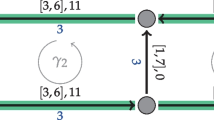Abstract
We describe the periodic event scheduling problem (PESP) based on periodic event networks and extend it by symmetry constraints. The modeling power of the PESP is discussed for automatic calculation of feasible periodic railway timetables. Including the described extensions, complete modeling of integrated regular-interval timetables is possible. Encoding the PESP to propositional logic enables the usage of efficient SAT solvers for solving the PESP. However, optimizing timetables by linear programming is possible, too. As almost all real-world timetable problems are heavily overconstrained, methods for automatic resolving of conflicts are described. Since there is still a lack of efficient conflict resolving algorithms for large-scale intermeshed railway networks, we introduce several strategies for efficiently resolving conflicts and intelligently decomposing timetable problems and discuss the trade-off between computation time and reduction of the solution space. These strategies allow quick adaption to small changes as well. The described methods are implemented in the software system TAKT. We apply the enhanced TAKT to a timetabling study and present some key figures and results.






Similar content being viewed by others
References
Audemard G, Simon L (2013) Glucose 2.3 in the sat 2013 competition. In: Proceedings of SAT competition 2013—solver and benchmark descriptions. University of Helsinki, pp 42–43
Cacchiani V, Toth P (2012) Nominal and robust train timetabling problems. Eur J Oper Res 219(3):727–737
Cook SA (1971) The complexity of theorem-proving procedures. In: Proceedings of the third annual ACM symposium on theory of computing, STOC ’71ACM, New York, pp 151–158
Großmann P (2011) Polynomial reduction from PESP to SAT. Tech. Rep. 4, TU Dresden
Großmann P (2012) Extracting and resolving local conflicts in periodic event networks. Diploma thesis, TU Dresden
Großmann P, Hölldobler S, Manthey N, Nachtigall K, Opitz J, Steinke P (2012) Solving periodic event scheduling problems with SAT. In: Advanced research in applied artificial intelligence—25th international conference on industrial engineering and other applications of applied intelligent systems, Lecture Notes in Computer Science, vol 7345. Springer, pp 166–175 (2012)
Kümmling M (2013) Umlegungsbasierte Fahrplanoptimierung von Personenverkehrstaktfahrplänen. Seminar paper, TU Dresden
Kümmling M (2014) Erkennung und Auswertung von signifikanten Konflikten in der Taktfahrplanung. Diploma thesis, TU Dresden
Lichtenegger M (1990) Der Taktfahrplan—Abbildung und Konstruktion mit Hilfe der Graphentheorie, Minimierung der Realisierungskosten. PhD thesis, Technische Universität Graz
Liebchen C (2006) Periodic timetable optimization in public transport. Dissertation, PhD thesis. TU Berlin, Berlin
Manthey N, Saptawijaya A (2010) Towards improving the resource usage of SAT solvers. In: Berre DL (ed) POS-10, vol 8. Edinburgh, pp 28–40
Müller W (1934) Betriebstechnische Untersuchung der freien Strecke. Organ für die Fortschritte des Eisenbahnwesens 89(3):41–54
Nachtigall K (1998) Periodic network optimization and fixed interval timetable. Habilitation thesis, Universität Hildesheim
Opitz J (2009) Automatische Erzeugung und Optimierung von Taktfahrplänen in Schienenverkehrsnetzen. Gabler Verlag, Wiesbaden. PhD thesis. TU Dresden
Ryvchin V, Strichman O (2011) Faster extraction of high-level minimal unsatisfiable cores. In: Sakallah KA, Simon L (eds) SAT, Lecture Notes in Computer Science, vol 6695. Springer, Berlin, pp 174–187
Serafini P, Ukovich W (1989) A model for periodic scheduling problems. SIAM J Discrete Math 2(4):550–581
Stähli S (1970) Grundfragen der Fahrplangestaltung, 2nd edn. Bern
Tanjo T, Tamura N, Banbara M (2011) A compact and efficient SAT-encoding of finite domain CSP. In: SAT, pp 375–376
Törnquist J (2006) Computer-based decision support for railway traffic scheduling and dispatching: a review of models and algorithms. In: 5th workshop on algorithmic methods and models for optimization of railways (ATMOS’05), no. 2 in OpenAccess Series in Informatics (OASIcs)
Weiß R, Opitz J, Nachtigall K (2014) A novel approach to strategic planning of rail freight transport. In: Operations research proceedings 2012. Springer, Heidelberg, pp 463–468
Author information
Authors and Affiliations
Corresponding author
Rights and permissions
About this article
Cite this article
Kümmling, M., Großmann, P., Nachtigall, K. et al. A state-of-the-art realization of cyclic railway timetable computation. Public Transp 7, 281–293 (2015). https://doi.org/10.1007/s12469-015-0108-5
Published:
Issue Date:
DOI: https://doi.org/10.1007/s12469-015-0108-5




